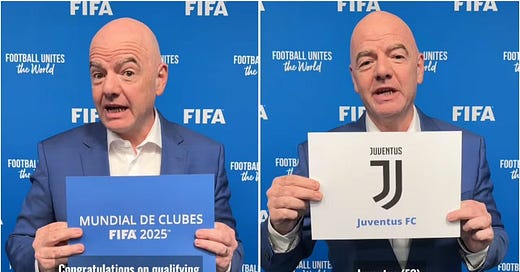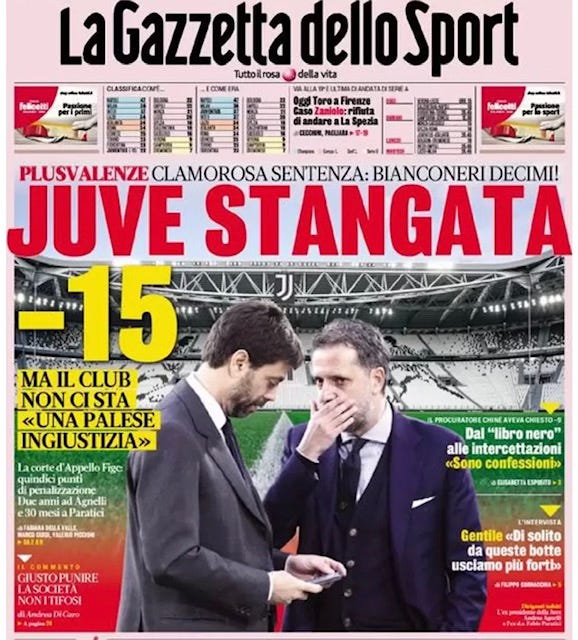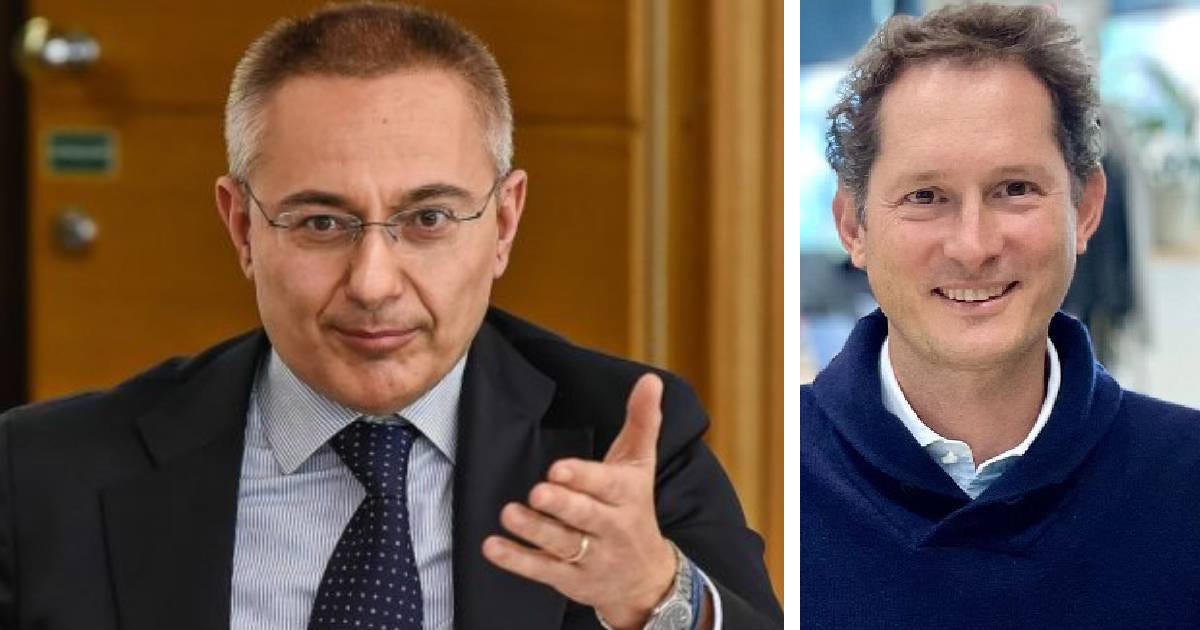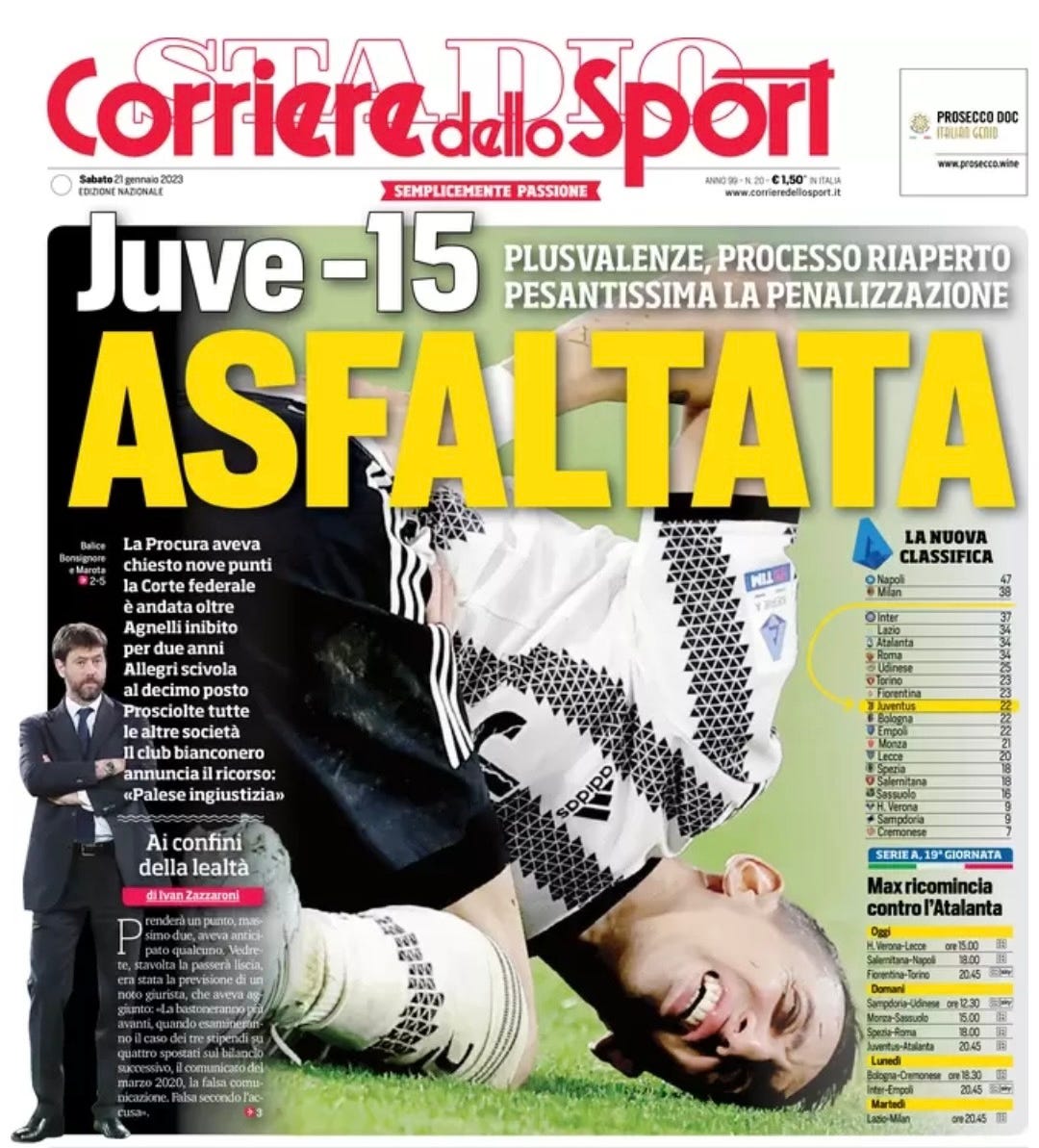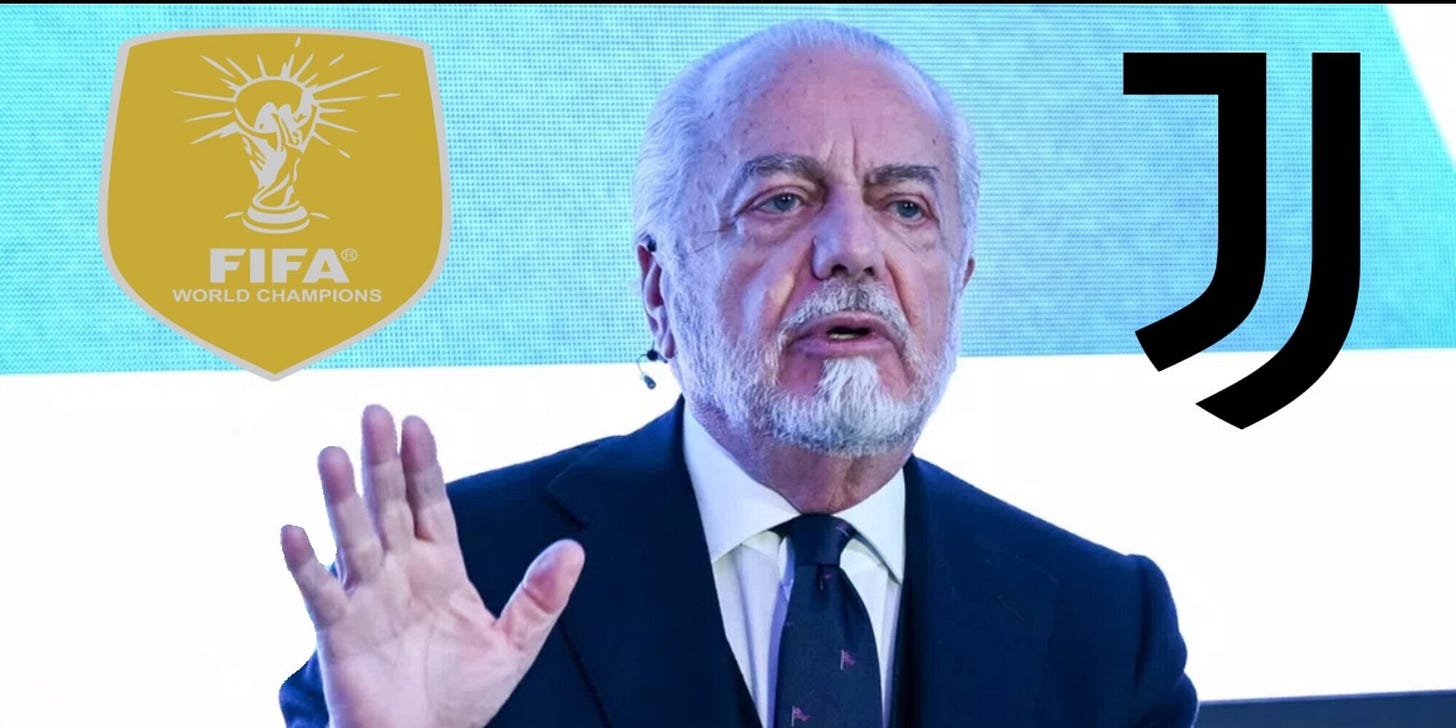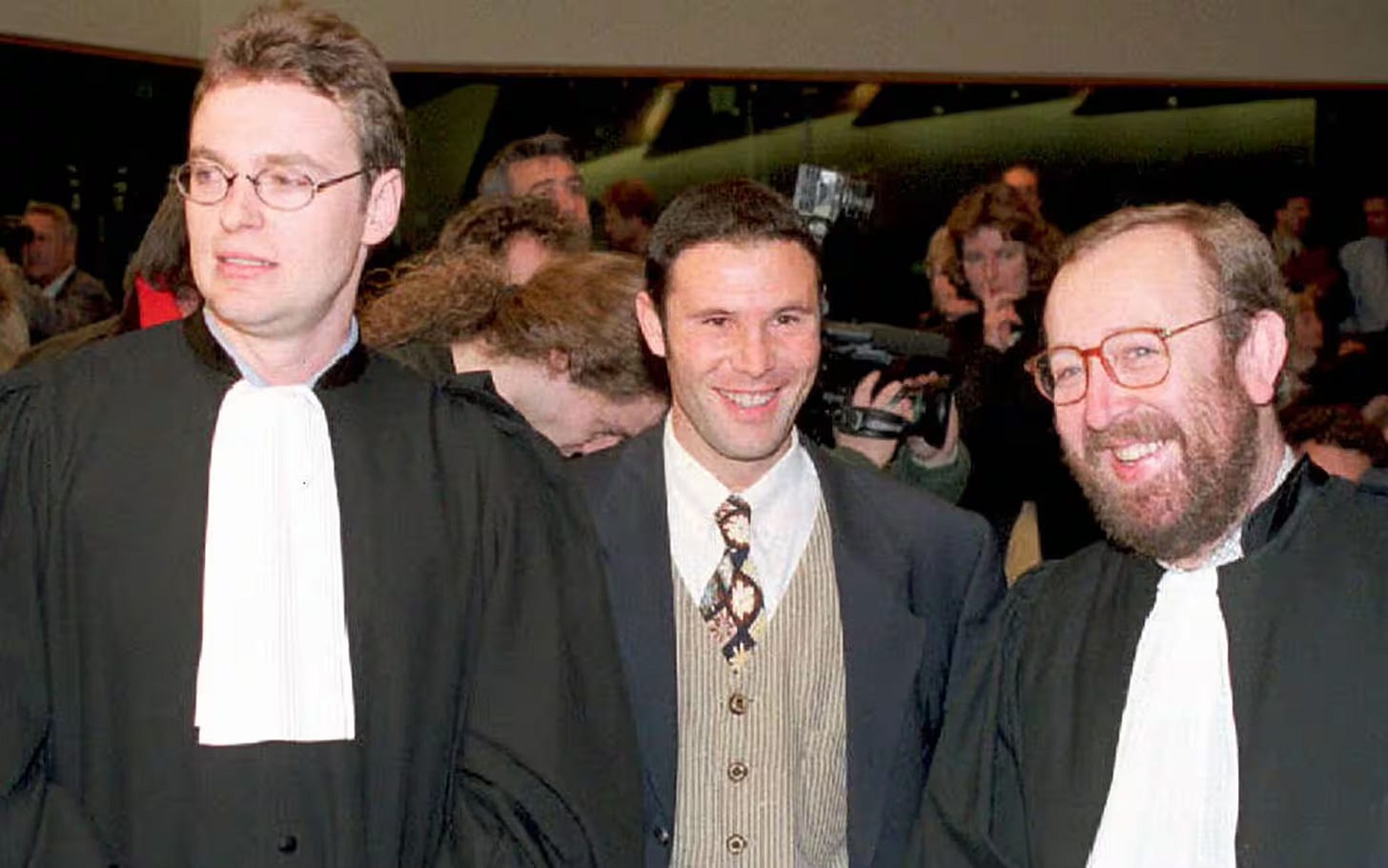Juventus is heading to the Club World Cup thanks to the Champions-points earned with the rigged financial statements that, as Chinè said, "falsified multiple championships".A theft at Napoli's expense
"Fictitious capital gains allowed them to put real money into the transfer market and sign players, distorting competition to the detriment of other clubs," said the FIGC prosecutor. A real scandal
(Translated into english by Grok)
For everyone’s benefit, I’m republishing today an article I wrote for my paid Substack subscribers on March 5 of last year, titled: “Club World Cup: When Chinè Accused Juventus of ‘Rigging Multiple Championships.’ For the Same Financial Statements Deemed Fraudulent by UEFA Too”, with the subtitle: “Both the Court of Appeal and the Guarantee Panel sided with Chinè: we’re talking about the same falsified financial statements Juventus submitted to UEFA to play in the Champions League, which led to their disqualification.”
If you’re wondering what all this has to do with the Club World Cup, I suggest you take 5 minutes of your time to read the following calmly and carefully. If you don’t agree, let me know.
From my March 5, 2024, article on “Palla Avvelenata” for paoloziliani.substack.com.
“It is consistent with the new evidence acquired by the Turin Prosecutor’s Office to reassess the severity of the alleged conduct and thus increase the requested sanctions. The new evidence highlights the particular gravity, from a sporting perspective, of the actions taken, which impacted and falsified multiple professional Serie A championships.”
And further: “In the seasons under scrutiny, the club had very significant losses, but instead of dipping into their own pockets to cover them and thus refraining from transfer activity, they created fictitious capital gains that allowed them to put real money into the market and buy players they then fielded, distorting sporting competition to the detriment of other clubs that genuinely covered their losses and didn’t engage in the market—some even had to sell their family jewels. There are clubs that had to offload players who scored 20 goals a season, and the following year they paid the price in the standings.”
Question: Who said these words? I know it’ll come as a surprise to many, so brace yourselves: they were spoken by Federal Prosecutor Chinè during the closing arguments of the second capital gains trial against Juventus, held at the Court of Appeal (January 2023). This was the only sporting trial Juventus faced in the Italian sporting jurisdiction, as the other four cases (wage maneuver 1, wage maneuver 2, dealings with “friendly” clubs, and relationships with colluding agents) were wiped out by the infamous plea deal with the FIGC, ratified on May 30 of last year.
At the end of this closing statement, which I’ve quoted verbatim—an utterly damning indictment (according to Chinè, Juventus had, no less, falsified multiple championships to the detriment of all other clubs)—the federal prosecutor requested a 9-point penalty for Juventus. The Court of Appeal, after reviewing the evidence, deemed it insufficient and raised it to 15 points.
So, it’s certain that Chinè wasn’t out of his mind: even the judges agreed that Juventus had falsified multiple Serie A championships with its illicit conduct—only they believed the punishment should be harsher than what the prosecutor had requested. For the record: in the final ruling of the “capital gains bis” trial, held in May 2023, Juventus’ penalty was definitively set at 10 points by the Guarantee Panel—still one point more than the 9 Chinè had sought for a club accused of the terrible charges outlined above, a club that, beyond any reasonable doubt, had falsified multiple Serie A championships. Proven guilt. Final verdict. Case closed.
(PALLA AVVELENATA by Paolo Ziliani is a reader-supported publication. To receive new posts and support my work, consider becoming a free subscriber or a paid subscriber)
Now, let’s recall that all this stemmed from just one of the five offenses Juventus was charged with, and that for the other four, a shady deal with the FIGC spared the club from trials in exchange for a fine of 718,000 euros (!). The question is this: if it’s true, as Italian sporting judges definitively established, that Juventus falsified multiple Serie A championships by rigging its financial statements, it follows that since these are the same statements submitted to UEFA to gain admission to the Champions League—statements that were rigged—Juventus also falsified the last five Champions League tournaments it participated in. And indeed, after independently reviewing the Turin Prosecutor’s documents through its control body, the CFCB, UEFA issued a statement on December 1, 2022, announcing an investigation into Juventus regarding the regularity of its 2018, 2019, 2020, 2021, and 2022 financial statements, reserving the right to “take any legal action it deems appropriate and impose disciplinary measures in accordance with applicable CFCB procedural rules.” This happened: a case was opened against Juventus, its guilt was established, and the club—facing a proposed three-year ban from the CFCB due to the severity and repetition of the offenses—was disqualified for one year last summer and fined 20 million euros. This was a reduced sanction compared to the CFCB’s request, partly due to Juventus’ official pledge, announced in a statement days earlier, to abandon the Super League project. Juventus admitted its guilt and did not appeal. So, in Europe too: proven guilt. Final verdict. Case closed.
Now, back to the point: does it seem normal to you that Juventus—proven guilty of falsifying not only multiple Serie A championships but also the last five Champions League tournaments it played in, a club that didn’t appeal its conviction, thereby admitting its guilt—retained the 47 points it earned in the UEFA Champions League rankings from three editions (2020-21, 2021-22, 2022-23) it shouldn’t have been allowed to participate in, having illicitly stolen the right to compete from the fifth-placed teams in the respective prior Serie A seasons (for the record: Roma in 2019-20, Napoli in 2020-21, and Lazio in 2021-22)? This makes no sense from any perspective: it’s unthinkable that someone steals, gets reported, tried, and convicted, yet keeps the stolen goods.
I’m neither a lawyer nor a judge, but if Belgian lawyer Jean Louis Dupont (pictured above, right) managed in 1995 to revolutionize football by securing recognition of the basic right of the player he represented, Bosman—as well as every other footballer—to move and work at another club at the end of their contract without anything owed to their former team, it doesn’t seem an impossible feat for a respectable law firm to request, argue, and obtain from judges (sporting ones in this case) the recognition of a simple, basic, sacrosanct civil principle before it’s even a sporting one: if a European club participated in one or more UEFA tournaments by cheating, thereby illicitly accumulating advantages like credits in the UEFA and/or Champions League rankings, those credits—obtained through deceit and stolen from other clubs—must be taken away. They’re stolen goods; they must be returned.
Does that seem wrong to you?
P.S. I had already written, on December 18, 2023: “If everything I have just explained is true—and I challenge anyone to prove otherwise—I wonder if it wouldn’t be worth it for Aurelio De Laurentiis, the president of Napoli, to spend a couple of million on good lawyers, really good ones, and get from UEFA what he’s entitled to. The Napoli president had already remained silent in the face of the Calvarese theft when, on May 15, 2021, in Juventus-Inter 3-2, he invented a penalty for Juventus in the last minute of the match—without which Napoli would have mathematically qualified for the Champions League and Juventus would have been eliminated (instead, the opposite happened). But accepting that the thefts become two seems too much to me”.

